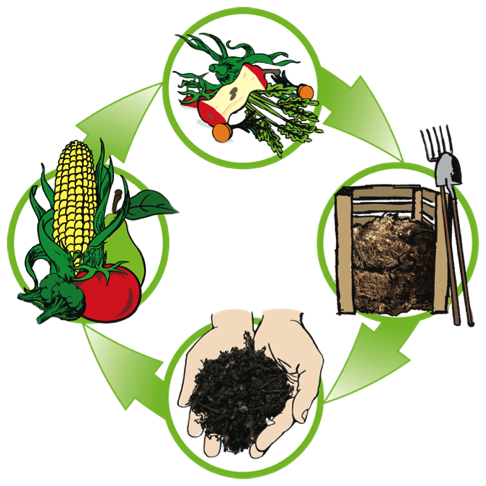Compost is organic material that can be used to amend soil
in order to help plants grow. Through
combining some of the organic waste you produce at home, and allowing it to
break down over time, you can create your own compost.
Why should you start composting?
You can use the compost you produce to supply a garden with a (free!) slow-release fertilzer, supplying essential nutrients (C,H,O,P,K,N,S,Ca,Fe,Mg,B,Mn,Cu,Zn,Mo,Ni,Cl) and eliminate the need to buy and use chemical fertilizer.
The compost you put down will encourage beneficial fungus
and bacteria production. These
microorganisms will help to break down organic material and produce humus (a
nutrient-rich material). This positive feedback within the soil will make sure to keep your plants happy
and healthy.
As an additional benefit, the earthy compost dirt will help your garden better retain water,
meaning less watering for you. Spreading
compost in sandy soil may also help water move laterally within the compost,
ensuring your plants will get some water before it runs off or percolates down. When starting a new garden, it is best to spread 3-4" over the garden area, and then til or rake the compost into the top 6" of soil matter.
Best of all, composting will help you seriously
reduce the amount of waste your household produces. According to the EPA, compostable organic
waste makes up 20-30% of what we throw away.
Less waste means less methane emissions from landfills, and a smaller carbon footprint for you.
So...what can you compost?
Compost is basically separated into two different categories--brown and green, or carbon and nitrogen:
Food
Scraps, Grass Clippings, Garden Clippings, Coffee Grounds
Green materials
These are the
composts source of Nitrogen, other nutrients, and moisture
Browns:
Brown Leaves, Wood Chips,
Straw, Saw Dust, Pine Needles, Newspaper, Shredded paper, Egg carton, Pet Hair, dryer lint, vacuum dirt
Straw, Saw Dust, Pine Needles, Newspaper, Shredded paper, Egg carton, Pet Hair, dryer lint, vacuum dirt
Brown Materials
These are the
composts source of Carbon, energy, and also help absorb moisture. They also provide structural support to a
pile compost, and allow air to better flow through the pile
Ideal composting is basically a nitrification cycle taking
place inside your "bin." Ideally, your carbon to nitrogen ration should be roughly 3:1 or at least 2:1. Sometimes this can
be difficult to achieve, but chances are, no matter what, your
stuff is going to break down over time, regardless of whether you have put
together the optimal blend of carbon and nitrogen.
*** Do not ever compost any type of animal
product or animal waste, citrus, *** chemicals (herbicides, pesticides)
Now that you know what a great idea composting is, I am sure
you are wondering: how can I start my own composting project at home?
There are a lot of different ways to compost at home. Two of the most popular and easy to maintain
are on the ground units, and rotating
drum units
On the ground units are commonly made of wood and fairly
easy to build. The compost sits directly
on the ground and decomposers from the soil below aid in decomposition. With an on the ground composting unit, it is important to add your green material, and cover it with brown material. The pile may also be stirred in order to
aerate the compost and speed the decomposition.
Rolling drum units can be bought from a number
of retailers, or made if you have the materials and the know how. These units are up, off the ground on either
a stand or base. They are designed to be
rolled, and aerated easily. In order to get
the best results from this unit, continue to add material until the drum is full, and allow the entire drum to
decompose before removing any compost.
You could also use a combination of containers--ex. tumbler to get your compost started quickly, then transfer it to a ground unit to finish once the tumbler is full, so that you can continue adding to the tumbler.
More information on composting at home can be found at: http://www2.epa.gov/recycle/composting-home
or
http://letseat.whro.org/on-your-plate/208-composting-matter-matters
Compiled by Clint Boaz, Intern; Edited by Trista Imrich, Pearl Homes Coordinator, LRNowMore information on composting at home can be found at: http://www2.epa.gov/recycle/composting-home
or
http://letseat.whro.org/on-your-plate/208-composting-matter-matters








No comments:
Post a Comment